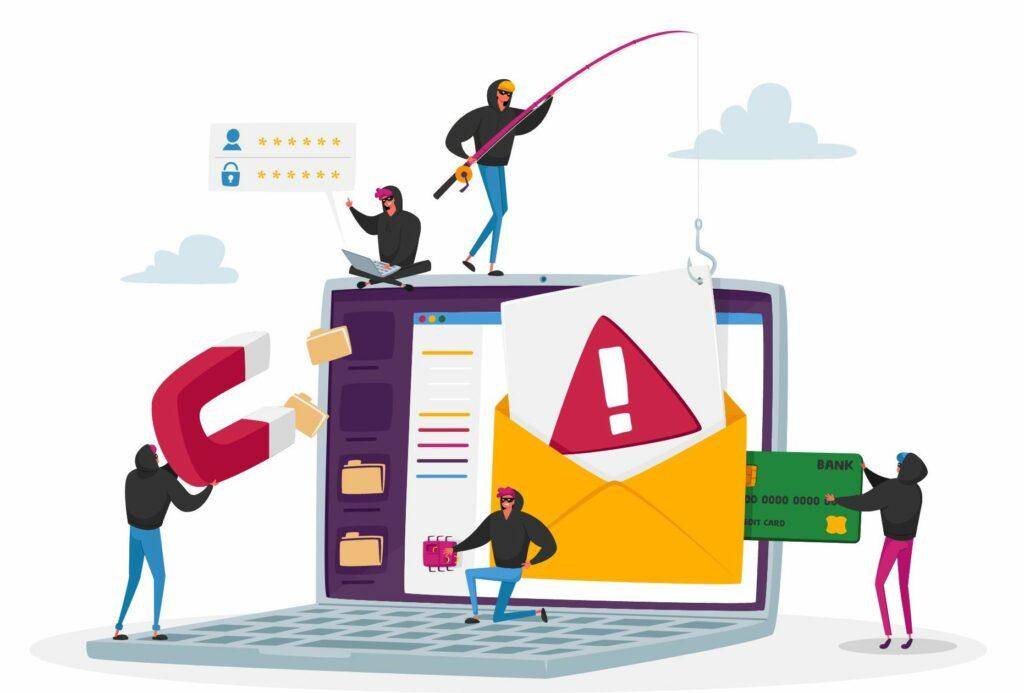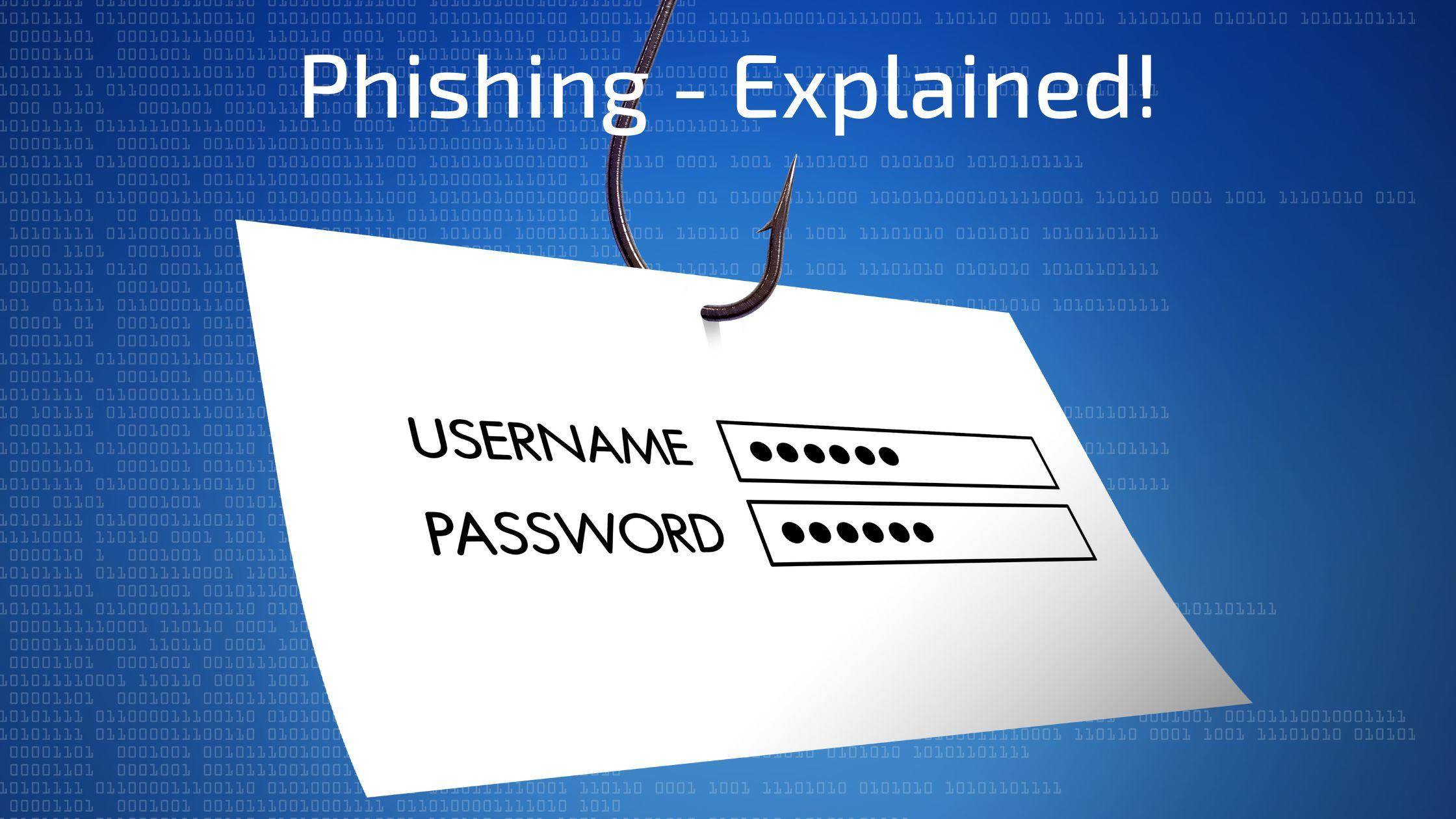Table of Contents
ToggleWhat Does Phishing Mean, Types, Risks And How To Prevent It
What does phishing mean?
Phishing is a type of cyber attack in which an attacker uses email to try to trick the victim into giving up personal information such as Passwords, Credit Card details or Social Security Identification.
Phishing can occur through a fake website that looks like the real thing and directs users to enter their login information. Another form of phishing involves sending emails from what appear to be legitimate sources but actually contain malware that infects computer systems and then uses those computers for other illegal activities.
It is a type of cybercrime where for example, scammers send emails that look like they’re from real businesses, such as your bank or the IRS, in an attempt to get you to reveal personal information. Scammers might ask you to wire money or provide Credit Card information by email. They may also ask for login details or other sensitive data.
How does phishing work?
Scammers use a variety of methods to get you to click on their malicious links and enter your credentials into fake websites. They may disguise their messages as urgent requests from your favourite Company or impersonate someone you trust (like an older relative). The scammer then waits for you to fall victim and enter your login credentials, allowing them access to your accounts without ever having met face-to-face!
What are the most common types of phishing attacks & Scams?
Some of the most common types of phishing are:
- Email phishing: This is the most popular method scammers use to target victims. They send out a fake email and hope that you fall for it. The email may look like an urgent message from your bank or credit card Company, asking you to click on a link or attachment that will take you to a malicious website. There, you’ll be prompted to enter sensitive information such as passwords and account numbers.
- Spear phishing: Spear phishing is a specific type of phishing attack that targets a specific Organization or individual. Spear phishers use social engineering techniques to gather personal information about their target and then include this information in the phishing email. Phishing emails are often personalized with the recipient’s name, making them seem legitimate. In some cases, they contain sensitive data such as bank account numbers or passwords that have been found on LinkedIn or Facebook profiles or even from websites that have leaked your information in the past due to a cyber attack.
- Whaling: Whaling is a specific type of phishing attack that targets high-profile individuals, usually executives or other members of the upper management. Whaling is often carried out by sending an email to an executive from what looks like a legitimate source, such as their bank, requesting personal information such as passwords or account numbers. The scammer may even claim that he needs this information for security reasons so that he can log into your account and fix an issue that he found in your account. This information can be used for a number of purposes including financial gain or corporate espionage.
- Smishing: Smishing is a variation of phishing that uses text messages to trick victims into divulging personal information. Unlike traditional phishing scams, smishing may not involve sending emails at all. Instead, scammers will send text messages with links to fake websites that look like they are associated with your bank or other institutions you have an account with. This can lead users to give up their personal information without noticing anything suspicious about the message or web address.
- Vishing: Vishing is a variation of phishing that uses phone calls to trick victims into revealing personal information. Like smishing, vishing may not involve sending emails at all. Instead, scammers will call and claim to be calling from your bank or other institutions you have an account with in order to get users to give up their personal information such as passwords and PINs. The scammer may ask for this information under the guise of “verifying” your identity or claiming that they need it in order to resolve an issue with your account.
There are many other types of scams involving fake websites and emails designed to trick users into revealing financial details such as Credit Card numbers and Passwords for online accounts such as PayPal and eBay. Some of the most common phishing scams include:

- Emails that appear to be from the IRS or other government agencies.
- Emails that claim to be from a Company you do business with such as PayPal and eBay, but instead contain links to fake websites designed to steal your information.
- Emails that claim your computer has been compromised by a virus and warning users to install an attachment containing software that will actually infect their computers.
What causes phishing?
Phishing scams are conducted mostly by email. The scammer sends out emails that look like they’re from a legitimate and trusted business or person, but they ask you to click on a link and enter personal information that could lead to identity theft. Some phishing emails can be very convincing; some even include links that appear to be from well-known brands like PayPal or Amazon, but actually go to a fake website where you’ll be asked for your information. The main objective of phishing attacks is to trick people into handing over their money/information/etc.
What are the risks associated with phishing?
When you fall for a phishing scam, your sensitive information could be at risk. If a hacker gets hold of your password and username, they could easily log into your email account. They can also use this information to get into other accounts that you use the same passwords on. The more information they have, the easier it will be for them to steal money from your Bank Account or Credit Card Company.
Your reputation is at stake when someone finds out that you fell for a phishing scam because it makes people think less of you as both an individual and an Organization. If customers see news reports about hackers accessing companies’ emails through their employees’ computers, they may decide not to do business with those companies anymore because they don’t feel safe doing so or don’t trust that their personal information is safe there anymore.
When people don’t trust businesses enough because too many employees have been tricked into giving up sensitive data by hackers through phishing scams such as these ones mentioned above, then productivity goes down which means less profits being made by those businesses!
How can you prevent phishing attacks?
The best way to prevent phishing attacks is by following these simple tips:
- Don’t open attachments or links from unknown sources.
- Don’t click on links in emails (and don’t open the email if you don’t recognize the sender).
- Don’t give out personal information such as Passwords, Credit Card Numbers, Bank Account details, and so on.
- Don’t download attachments from unknown sources. If in doubt about an email attachment’s authenticity, either delete it or scan it using antivirus software before opening it up.
- For safe browsing on your computer and mobile devices, install antivirus software and keep it updated regularly with automatic updates enabled for maximum protection against malware downloads; also enable pop-up blockers for browsers like Chrome or Safari so that you’re protected when visiting websites that spread malware via malicious ads promoting fake products or services that can infect your computer when clicked upon—this includes social media sites such as Facebook where fake news stories often appear alongside legitimate ones (a common tactic used by scammers) so be careful when clicking on anything while browsing online!
Conclusion
In a nutshell, phishing is a very dangerous cybercrime which can put your personal data in the hands of criminals. It is also a common way for hackers to try and steal information from online users. People should be aware that these attacks are quite common and need to take appropriate steps in order to avoid falling victim or suffering any other consequences. Have You Heard About the Whale Phishing Attack?
FAQs:
How to identify a phishing email?
Phishing emails are designed to look as authentic as possible. If you receive an email from a Company or website you do business with, check the address carefully and make sure it’s correct before clicking on any links or attachments. Also, if the message asks you to provide personal information such as your password or credit card number, don’t reply!
What will happen if you reply to a phishing email?
If you reply to a phishing email, you may end up giving away your personal information. This could be as simple as providing your email address or password, or it could mean handing over your Credit Card Number or Social Security Number. If this happens, the scammer will use this information for identity theft or financial fraud purposes.
What is online fraud?
Online fraud is similar to phishing, but it doesn’t involve email. Instead, scam artists try to trick you into providing personal information by creating fake websites that look almost identical to the real thing. They may also use social media accounts or chat apps such as WhatsApp and Telegram to communicate with their victims.
Who is targeted by phishing?
Phishing is a popular scam that targets people of all ages and backgrounds. It is not limited to any particular group or demographic, and it often affects people who are more tech-savvy than others. Phishing scams can target anyone with an email address or social media account.
What is a common indicator of a phishing attempt?
- Emails or messages that appear to come from a legitimate source and ask for personal information such as passwords, account numbers or credit card details.
- Links in emails that take you to fake websites designed to steal your personal information.
- Messages on social media accounts from people who claim to be from an official organisation, but who are not.
How are people targeted using phishing?
People are often targeted using phishing scams by email, SMS, phone calls or even on social media.
How can phishing be prevented?
- Be careful what you click on.
- Don’t reply to an email that asks for personal information, especially if it seems like it’s from a legitimate source. Instead, contact the organisation directly to check if they have sent you something.
- Report suspicious emails or messages to your internet provider or police.
What is the best protection against phishing?
Phishing can be prevented by being vigilant and knowing how to spot a scam. If you receive an email that looks like it has come from someone you know but is asking for personal information, don’t reply.
What should you do if you are a victim of phishing?
If you have been the victim of phishing, report it to your internet provider or police. Do not reply to emails by giving out the information asked or asking for more information, especially if they appear from a legitimate source. Contact the organisation directly to check if they have sent you something.
What are common elements of a phishing message?
Phishing messages are often poorly written, with spelling and grammatical errors. They may also contain typos and bad punctuation. The sender may not seem to be familiar with your name or the organisation they claim to represent. If you get an email from someone claiming to work for your Bank or Credit Card provider but have never heard of them before, check for a Company logo or contact details on their website first before replying.


